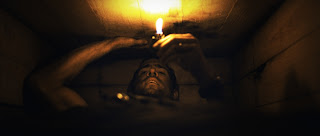Take Me Home Tonight doesn't have to take place in the 80s, but it does. Matt (Topher Grace), his twin sister, Wendy (Anna Faris), and Dan's lifelong best friend, Barry (Dan Fogler) are all at a crossroads in their lives. Matt graduated from MIT, but has spent the summer working at Suncoast Video in the mall (I remember those! I got my Sonny Chiba 10-pack there!) because he has no idea what he wants to do, and he doesn't want to be a failure. Movie characters: they're just like real people!
 |
| Suck it up, Matt. We've all been that guy, arms down in the crowd. |
 |
| "My name...? Henry. Henry...Suncoast-Video." |
This is not a movie that will surprise you. It hits all the basic 80's touchstones that you expect (cocaine, break dancing, soulless capitalism, Dexy's Midnight Runners, etc.) and the characters are all pretty stock. You mean that the main character and his best friend aren't the cool kids? And the main character has trouble talking to girls? What kind of world do we live in?!? Yes, the movie is pretty predictable. Yes, the characters are fairly shallow. If you're willing to accept that --- and I totally understand if you are not --- there is a surprisingly entertaining movie buried underneath all the gimmicky, cliched crap.
 |
| A movie with high school friends having pivotal conversations in a car? How avant garde! |
Let's plow through the acting first. Topher Grace is as awkward and goofy as ever, and he doesn't really change anything up here. I don't know why he seems to feel most comfortable with characters set in easily identifiable decades, but whatever, it's his career. Seriously, though, somebody should introduce him to Woody Allen and give him some challenging roles. Anna Faris, despite being the second biggest name in the cast, has a relatively small role in the film. I'm not a fan of most of her work, but she was fine as a not-funny character. Dan Fogler, who I assumed I would be annoyed with in this movie, was surprisingly funny at times. He didn't do anything too unpredictable or unusual, but he committed to all the stupidest parts in this movie and did his best to make them seem (somewhat) plausible. Honestly, I was shocked to find myself laughing at some of his bits; I like to think that is a major compliment to him. Teresa Palmer had a lot less to work with, since a large part of her role was to be an object of desire, but she wasn't annoying and handled the dramatic moments fairly well.
The supporting cast was largely just caricatures, but what else do you expect with a movie that aligns itself so strongly to a decade? Chris Pratt was a great douchebag character, as usual. Michael Biehn was a welcome surprise as Matt's semi-unsympathetic father, even if his inclusion in an 80's-themed movie was kind of a gimmick. Michelle Trachtenberg was underused as an oversexed goth chick, but I'm not really sure if she's talented or not, so maybe she was used enough. Comedian Demetri Martin was okay as a jerk paraplegic, but it wasn't the raucous bit role that the script clearly intended it to be. Similarly, Michael Ian Black and Bob Odenkirk contributed almost nothing in their supporting roles. On the bright side, aging supermodel and former Mrs. Stallone, Angie Everhart, has a topless and creepy sex scene with Dan Fogler.
 |
| Because this is plausible. |
Director Michael Dowse isn't particularly well-known for his subtle or thoughtful films. In fact, this is his highest-profile movie to date, so I guess he's not particularly well-known for anything. I wasn't impressed by Dowse. His camera work is pretty standard. If he has a good rapport with the actors, it wasn't apparent, since several comedic actors (with varying degrees of talent) were not very funny in this movie. The thing that bugged me most about Dowse's direction is how lopsided this movie is. The first half-hour is bad. If you can get past the initial thirty minutes of trite plotting, lame jokes, and poor comic timing, the rest of the movie is kind of cute. But having that obstacle --- one that will understandably stop many viewers --- is proof of how poorly this film was directed.
 |
| "Damn! Sick burn!" |
If you can get past the awful, Take Me Home Tonight has some surprisingly good parts. Topher Grace has a few moments of sincerity that hint at dramatic potential he hasn't come close to realizing yet. Dan Fogler, while fat and obnoxious, works well off the joke; I didn't usually laugh at what he said, but I liked his reactions to things. I thought that the main plot, while very predictable, was well-acted and believable. And there is one joke about the LAPD that I really, really liked. I should also point out that the 80's pop culture references are not nearly as frequent as I assumed they would be. Is that enough to recommend this movie? Maybe, maybe not. If you, like me, hate romantic comedies, this is a fairly pain-free (after the first third of the movie) option.
...and here is the decently amusing music video of a terrible cover of an 80's song I don't like, featuring the cast of Take Me Home Tonight.








































